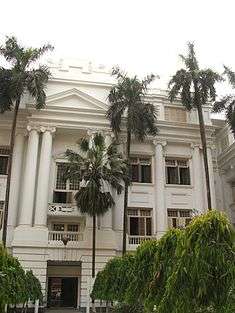Sagar Sengupta
Sagar Sengupta (born 23 June 1968) is an Indian immunologist, cancer biologist and a scientist at the National Institute of Immunology, India. Known for his studies on tumor suppressor gene and oncogenes, Sengupta is an elected fellow of all the three major Indian science academies namely the National Academy of Sciences, India, the Indian National Science Academy and the Indian Academy of Sciences. The Department of Biotechnology of the Government of India awarded him the National Bioscience Award for Career Development, one of the highest Indian science awards, for his contributions to biosciences, in 2011.
Sagar Sengupta | |
|---|---|
| Born | 23 June 1968 West Bengal, India |
| Nationality | Indian |
| Alma mater | |
| Known for | Studies on tumor suppressor gene and oncogenes |
| Awards |
|
| Scientific career | |
| Fields | |
| Institutions | |
Biography

Sagara Sengupta, born on 23 June 1968[1] in the Indian state of West Bengal, earned a postgraduate degree from the University of Calcutta and secured a PhD from the Indian Institute of Science.[2] He did his post doctoral studies at the Institut de Genetique et de Biologie Moleculaire et Cellulaire (IGBMC) in Strasbourg, France and completed it at the National Cancer Institute of the National Institutes of Health.[3] Subsequently, he joined the National Institute of Immunology, India as a faculty where he holds the position of a grade VI staff scientist.[4]
Professional profile
Sengupta's research focus is on the changes in the signaling pathways during cancer development and he has carried out studies on the tumour suppressor genes and oncogenes.[2] During his post-doctoral days at the National Institutes of Health (NIH), he undertook a project on NIH grant to study the Determination of regulatory mechanisms for BLM helicase.[6] His studies have been documented by way of a number of articles[7][note 1] and ResearchGate, an online repository of scientific articles has listed 50 of them.[8] Besides, he has contributed chapters to books published by others.[9] He has also undertaken several projects on behalf of the government agencies such as the Department of Science and Technology, the Department of Biotechnology and the Council of Scientific and Industrial Research as the principal investigator[3] and is associated with the Department of Biotechnology as a member of its Task force on Cancer Biology, the expert committee on Promotion and Popularization of Biotechnology and the Expert Committee for Twinning RD program for North Eastern Region.[10]
Awards and honors
Sengupta received the Best Thesis Award for his doctoral thesis from the Indian Institute of Science in 1991.[2] The Department of Biotechnology (DBT) of the Government of India awarded him the National Bioscience Award for Career Development, one of the highest Indian science awards in 2011.[11] The National Academy of Sciences, India elected him as a fellow in 2012[12] and he became an elected fellow of the Indian Academy of Sciences and the Indian National Science Academy in 2017.[13] He is also a member of the Guha Research Conference.[4]
Selected bibliography
Chapters
- Arpan Deyasi; Abhishek Basu (11 December 2015). Proceedings of National Conference on Frontline Research in Computer, Communication and Device (FRCCD-2015). Allied Publishers. pp. 12–. ISBN 978-93-85926-00-6.
Articles
- Sengupta, Sagar; Harris, Curtis C. (2005). "p53: traffic cop at the crossroads of DNA repair and recombination". Nature Reviews Molecular Cell Biology. 6 (1): 44–55. doi:10.1038/nrm1546. ISSN 1471-0080. PMID 15688066.
- Sengupta, Sagar; Robles, Ana I.; Linke, Steven P.; Sinogeeva, Natasha I.; Zhang, Ran; Pedeux, Remy; Ward, Irene M.; Celeste, Arkady; Nussenzweig, André (13 September 2004). "Functional interaction between BLM helicase and 53BP1 in a Chk1-mediated pathway during S-phase arrest". J Cell Biol. 166 (6): 801–813. doi:10.1083/jcb.200405128. ISSN 0021-9525. PMC 2172115. PMID 15364958.
- Sengupta, Sagar; Wasylyk, Bohdan (15 September 2001). "Ligand-dependent interaction of the glucocorticoid receptor with p53 enhances their degradation by Hdm2". Genes & Development. 15 (18): 2367–2380. doi:10.1101/gad.202201. ISSN 0890-9369. PMC 312780. PMID 11562347.
See also
Notes
- Please see Selected bibliography section
References
- "Fellow profile". Indian Academy of Sciences. 26 January 2018. Retrieved 26 January 2018.
- "Sagar Sengupta on NII". www.nii.res.in. 27 January 2018. Retrieved 27 January 2018.
- "Sagar Sengupta, profile in India Cancer Research Database". www.incredb.org. 27 January 2018. Retrieved 27 January 2018.
- "Indian fellow". Indian National Science Academy. 25 January 2018. Retrieved 25 January 2018.
- "NASI fellows". National Academy of Sciences, India. 25 January 2018. Retrieved 25 January 2018.
- Sagar, Sengupta (27 January 2018). "Determination of regulatory mechanisms for BLM helicase". Grantome. Retrieved 27 January 2018.
- "On Google Scholar". Google Scholar. 20 January 2018. Retrieved 20 January 2018.
- "On ResearchGate". On ResearchGate. 20 January 2018. Retrieved 20 January 2018.
- Arpan Deyasi; Abhishek Basu (11 December 2015). Proceedings of National Conference on Frontline Research in Computer, Communication and Device (FRCCD-2015). Allied Publishers. pp. 12–. ISBN 978-93-85926-00-6.
- "Sagar Sengupta - Speakers - Indian Academy of Sciences". www.ias.ac.in. 27 January 2018. Retrieved 27 January 2018.
- "Awardees of National Bioscience Awards for Career Development" (PDF). Department of Biotechnology. 2016. Retrieved 20 November 2017.
- "NASI Year Book 2015" (PDF). National Academy of Sciences, India. 25 January 2018. Retrieved 25 January 2018.
- "Fellowship - Indian Academy of Sciences". www.ias.ac.in. 27 January 2018. Retrieved 27 January 2018.
External links
- Sagar Sengupta (21 July 2017). "Mechanisms that Prevent Carcinogenesis: Study of a Family of Caretaker Tumour Suppressors" (YouTube video). Indian Academy of Sciences. Retrieved 27 January 2018.